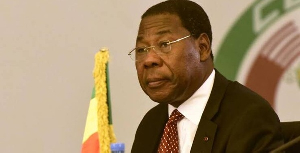Minister for Works and Housing, Francis Asenso-Boakye, has attributed the lack of adequate housing infrastructure to the non-existence of a regulatory authority in the housing sector.
He believes a proper regulatory institution, such as Ghana Housing Authority, would address and ensure harmonisation and standardisation of the housing development in the country.
In view of this, the minister noted that plans are far advanced in the establishment of ‘Ghana Housing Authority’, which will have a duty to plan, develop and manage public housing in the country and also serve as a regulator.
“There is a serious institutional disconnect because as we speak, we do not have an institution whose sole duty is to drive public housing in Ghana, and that is what government is currently working on to establish a Ghana Housing Authority whose duty will be to plan and manage housing in the country. Ghana Housing Authority will come up with schemes which will help reduce the cost of housing for Ghanaians."
“Because of this institutional gap, there was no institution to investigate some of these projects – like the Saglemi Affordable Housing Project – to ensure that they are viable before government put money into it. We have taken the necessary steps to set up the Ghana Housing Authority, which we are about sending to Cabinet, and once it is accepted, it will be sent to Parliament for consideration and approval,” he hinted.
Mr. Asenso-Boakye made these comments during a panel discussion at the 7th Opemsuo public lecture series organised by the Asante Professionals Club at Kumasi, Ashanti Region.
Touching on the expensive nature of housing in the country, the minister noted that government has identified certain key components such as cost of land, issues with land tenure system (double sales and activities of Land Guards), lack of infrastructure, cost of building materials, among others, and is finding ways to deal with the challenges.
He revealed that under government’s new affordable housing programme, it would seek to subsidise imports of building materials, use public lands and support infrastructure to help reduce the cost of housing by 40 percent.
“The new programme is going to subsidise heavily, and it is based on available research which says that 60 percent of Ghanaians need some sort of support from government before they can access housing. About 35 percent of them, even if government supports them, can never access housing."
“Government’s policy direction will be to target these 60 percent with some sort of support. Currently, government is leveraging public lands and support with infrastructure which will help reduce the cost of construction by 40 percent and give the lands to private developers. Government will subsidise imports of building materials by granting import duty exemptions, etc. All these – put together – will reduce the cost of housing in the country. We are working with the Finance Ministry to put together a very credible mortgage scheme,” Mr. Asenso-Boakye added.
Business News of Thursday, 8 December 2022
Source: thebftonline.com













